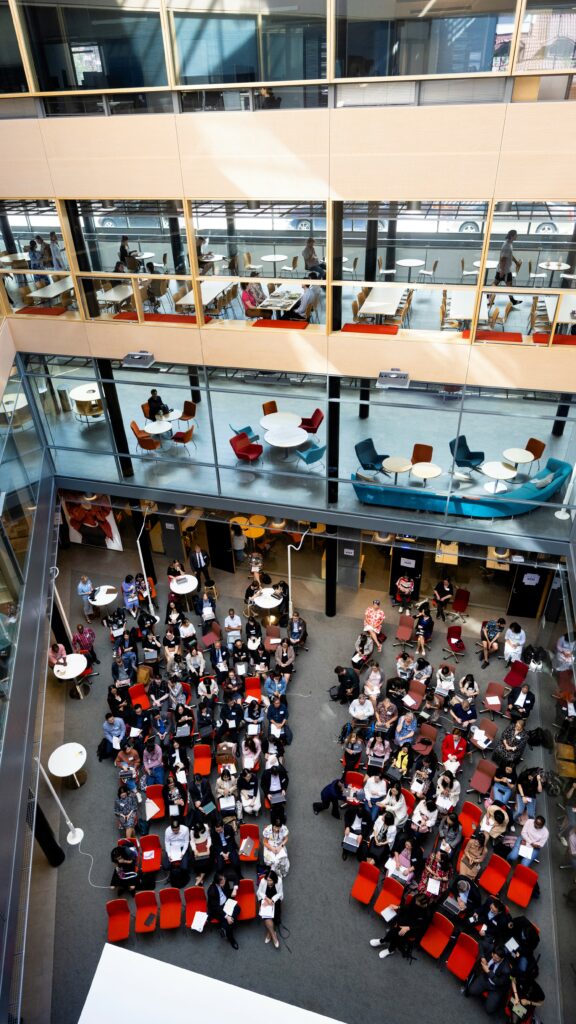The JoLII-GINTL Global Conference
The Sino-Finnish Joint Learning Innovation Institute (JoLII) is based on the Memorandum of Understanding that was signed between the University of Helsinki and Beijing Normal University in 2015 (and which was renewed in 2020). JoLII aims to function as a platform of collaboration between educational organisations and experts from Finland and China. Current JoLII members include universities, companies, educational societies, and schools from Finland and China.
Perhaps the most visible JoLII activity is the annual conference that alternates between Finland and China. The three previous conferences have been held online due to COVID-19 restrictions, but, after consulting with other Finnish JoLII institutions, this year’s conference was agreed to be held in person at the University of Helsinki. Organising the conference as an onsite event would enable face-to-face interaction between the participants – a goal which encouraged us organisers to include not only keynote speeches, workshops, and thematic sessions in this year’s programme, but also an optional third-day programme that would allow participants to explore Finnish culture and connect with one another all the more.

Because of the high number of shared goals, activities, and resources between JoLII and GINTL China, we wanted to add some GINTL flavour to this event, thus naming it the JoLII-GINTL Global Conference. In addition, this year, the substantial financial support and human resources provided by the University of Helsinki GINTL Coordination made it possible to organize the conference without any registration fee, therewith making the event accessible to a broad range of participants.
This year’s programme
The future of education
The main theme of the 2023 JoLII Global Conference was “Education for the Future”. The conference theme draws inspiration from the 2021 UNESCO report “Reimagining our Futures Together”, which emphasises the need for a new social contract for education to repair injustices while transforming the future.
There are many global challenges in education, including the inequality of opportunities for high-quality learning and gaps in the availability to new digital technology and learning environments. These and other educational challenges call for research and innovation, as well as global solidarity and international cooperation. The JoLII-GINTL Global Conference aimed to be an arena for carrying out these discussions and sharing research and solutions to realise education for the future.
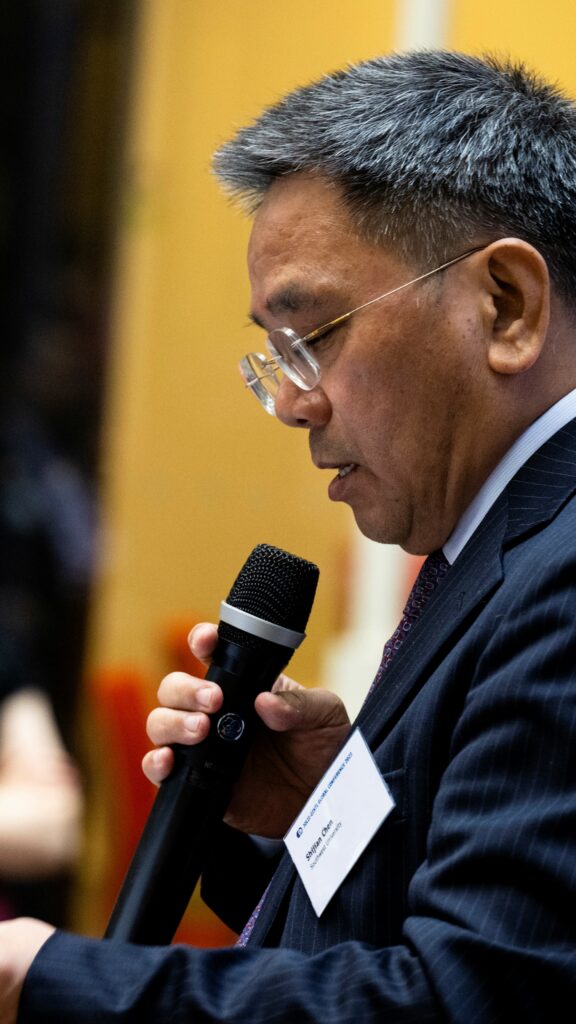
Keynotes, workshops, and thematic sessions
Keynotes
The keynote speeches unequivocally highlighted important topics within the larger theme of “Education for the Future”. The first keynote speech, delivered by Professor Shijian Chen from China’s Southwest University, emphasised the importance of high-quality teacher education, focusing on Chinese normal universities in the new era. In the second keynote speech, Dr. Lauri Palsa from the National Audiovisual Institute in Finland discussed the development of competence-based education from a local perspective. In his speech, he stressed the importance of future competencies.
Photo (by Veikko Somerpuro): Keynote speaker Professor Shijian Chen (Southwest University) at the JoLII-GINTL conference
The third keynote speech, delivered by Professor Pigga Keskitalo from the University of Lapland, Finland, reviewed high-quality education using remote teaching solutions as an example to reach students in sparsely populated regions. Professor Keskitalo also demonstrated, through the introduction of the Sami language distance education project, how technological solutions can support indigenous communities to preserve their language and culture. In the fourth keynote speech, Yuchi Zhao from UNESCO Rural Education discussed research-based practices in rural education and called for action regarding sustainable development in rural areas. Among others, one question Zhao asked in the speech was how we can achieve development for all without sustainable development in rural areas.
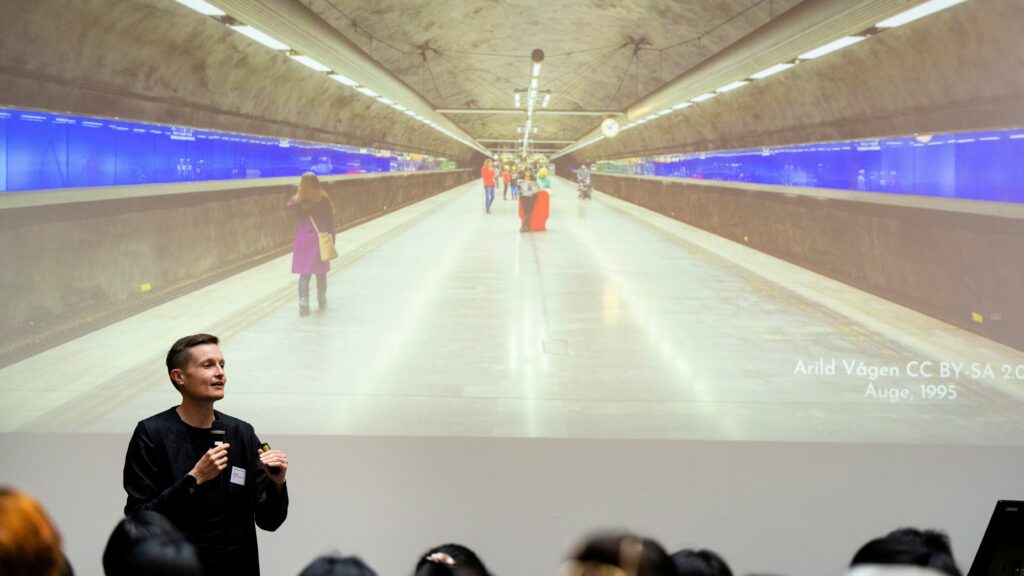
The fifth keynote speech was delivered by Professor Baocun Liu. He called for attention to the reshaping of the education system and for the establishment of high-quality education system for the future. His presentation aimed to review the challenges and concepts of reshaping education systems with comprehensive methods, including content analysis of international organizations’ reports. The last keynote speech was delivered by Dr. Crystal Green from HundrED. Dr. Crystal Green called on educational researchers to more systematically consider the ways financing shapes educational change. She draws attention to the mechanisms that release different types of funding for education and to the power of decision-makers who are able to set the agenda and allocate budgets. Dr Crystal Green and some of the other keynotes were also welcomed back to the central stage on the second day of the conference for a roundtable discussion titled “Leading the Change: Students, Educators, Researchers, and the Future of Education”, which was moderated by Mr. Alex Shapero.

Workshops
“Inquiry-Based Learning in Early Childhood Education Through Playful Teaching Methods”
The workshops that were held in addition to these keynote speeches divided the conference participants into three groups, based on their personal and professional interests. The workshop “Inquiry-Based Learning in Early Childhood Education Through Playful Teaching Methods” was hosted by Adjunct Professor Dr. Jonna Kangas from University of Helsinki. This workshop discussed teaching methods for children to learn through playing. The workshop strongly demonstrated the Finnish early childhood education playful learning attitudes and methods, which the participants were then encouraged to partake in themselves in a square bubble-shaping exercise. Dr. Jonna Kangas shared with the participants lots of practice examples of playful learning in early childhood education.
Photo (by Luna Erica): Conference organiser Shuanghong Jenny Niu participating in Dr. Kangas’s workshop
By the end of the workshop, all the participants were given the assignment of somehow creating a square bubble. There were tools available – bubble-blowing sticks; different liquids and sugar; different objects to potentially help in the bubble-making. The exercise triggered a creativity in the participants that is very rarely seen in research of any kind, and which left the whole room filled with colorful bubbles and laughter.
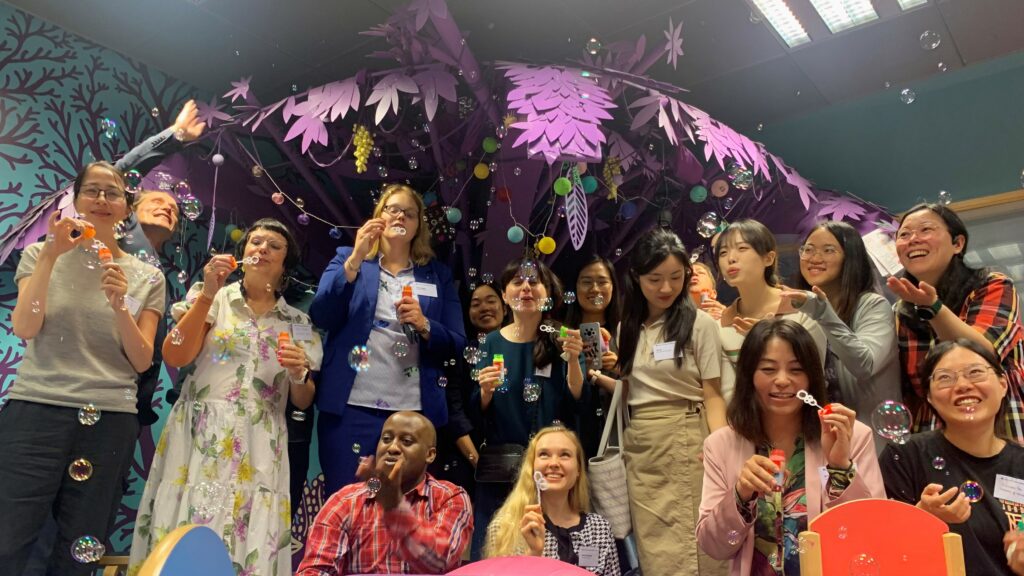
“Sustainability, Imagination and Practice: STEAM Education in Phenomenon-Based Learning and Real-World Problem-Solving”
The workshop hosted by Dr. Kristóf Fenyvesi, Dr. Werner Olivier, and Dr. Takumi Yada, titled “Sustainability, Imagination and Practice: STEAM Education in Phenomenon-Based Learning and Real-World Problem-Solving”, ran equally smoothly. The presenters spoke about the Warka water project in Africa which, by means of knowledge sharing, built a tower for water storage with a local community. The presentation also emphasised the benefits of integrating art and design in teaching STEM subjects, demonstrating the possibilities of such interdisciplinary teaching through the book MathArt Expressions by South African Youth: Creative Visual Connections with Mathematics that was put together by Werner Olivier, Flora Olivier, and their colleagues at Nelson Mandela University, Carine Steyn and Victoria Shezi. An exhibition of the same project will be held in Jyväskylä from the end of August until December. The workshop given by these presenters was a very hands-on one, instructing the participants to design a small water tower of their own using miniature pipes provided by the presenters.
Photo (by Ayu Maghfurroh): Workshop participants of the “Sustainability, Imagination and Practice: STEAM Education in Phenomenon-Based Learning and Real-World Problem-Solving” session

“Practical Issues of Quality Assurance in Sino-Finnish Joint Degree Provisions”
The final workshop, “Practical Issues of Quality Assurance in Sino-Finnish Joint Degree Provisions”, was hosted by Yulia Shumilova and Yuzhuo Cai from Tampere University, alongside Suhao Peng from the University of Eastern Finland and Gaoming Zheng from Shanghai Tongji University. Their workshop, which utilised a participatory World Café method, first introduced a newly developed tool for assessing and ensuring the quality of Joint Degree programs between Finnish and Chinese higher education institutions. After the introduction, the participants were divided into three groups, each hosted by a workshop facilitator and notetaker. In these groups, the participants had the opportunity to discuss their experiences with international higher education collaboration, as well as to provide feedback and ideas to be utilised in the further development of the new quality assurance tool. Even though the starting point of the tool is focused on cases involving Finnish institutions, it has clear relevance to higher education institutions elsewhere in Europe as well, as was brought up by workshop participants from other European countries during the workshop.
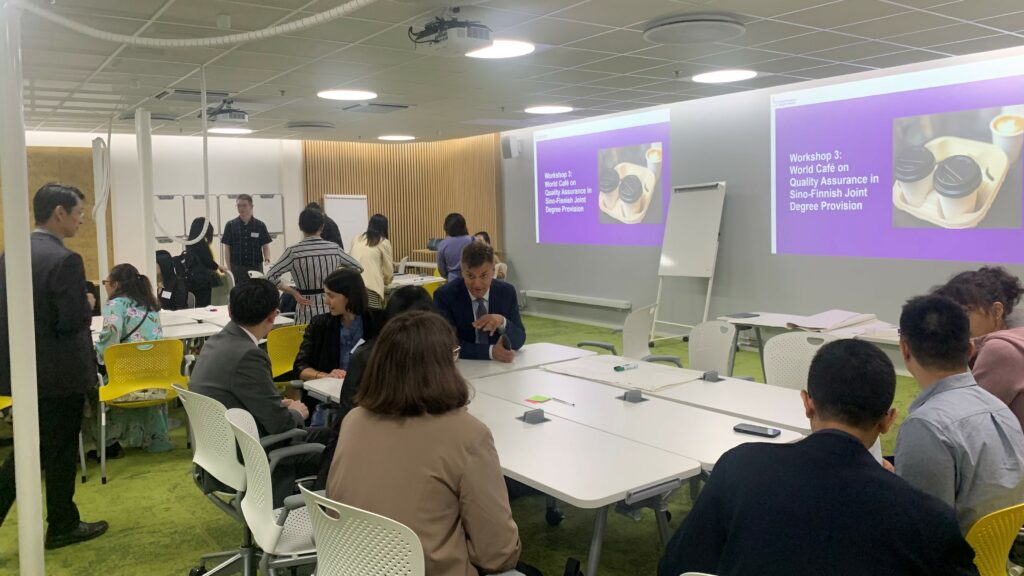
Thematic sessions
Overall, the thematic sessions, too, ran smoothly, with lively presentations and active discussions among the presenters and participants. There were eight simultaneous sessions on the first day, with a total 30 presentations, and seven sessions on the second day with 28 presentations. The topics covers various topics in the educational field, ranging from, for instance, Early Childhood Education to Teacher Well-Being to Technology in Education to Intercultural Perspectives and Global Academic Collaboration. Presenters and participants joined the participations from more than fifteen different countries, despite the conference’s general focus on Sino-Finnish educational topics.
Launch of the MOOC ‘Uncover Finnish Education’
Also part of the conference programme was the official launch of the University of Helsinki’s latest MOOC (Massive Online Open Course), ‘Uncover Finnish Education’. The MOOC is a groundbreaking one at the university in that it is the first MOOC ever done at the University of Helsinki on the topic of education. The launch was facilitated by the MOOC’s main editor, Mihaela Nyyssönen, and included speeches by Prof. Hannele Niemi (co-editor of the MOOC) and Sai Väyrynen (Director of GINTL).
GINTL played a significant role in the MOOC through financial support for its development, producing some of the learning content, and taking part in the project’s steering group. The course was created in a collaborative process between academics, students, teachers, and other experts in the field of (Finnish) education, and therefore includes a vast range of professional standpoints. Its creation has been a fruitful team effort reaching from GINTL and the University of Helsinki’s Faculty of Educational Sciences to the wider university and beyond.
The MOOC is now available online and, well in line with GINTL’s aims, is set up to be freely accessible anywhere in the world, at any time, without any tuition fees attached – not even for the certificate that you can earn by completing the course.
Excursions
On the unofficial ‘third day’ of the conference, attendees had the opportunity to get a taste of Finland outside the walls of the conference venue. Three extra-conference experiences were organised: first, a campus visit to the Metropolia University of Applied Sciences campus in Myllypuro, Helsinki (which left attendees impressed with the institution’s modern design, facilities, and advanced teaching methods); second, a nature walk along a Finnish beach and through a Finnish forest (with, at the end, a real sausage-grilling experience in nature); and third, a lecture on the topic of education presented by Professor Justin Dillon from UCL’s Centre for Climate Change & Sustainability Education. The optional programme had a great turn-up and, most importantly, allowed attendees to socialise in a more informal setting and get to know one another – as well as Finnish culture – on a more personal level.
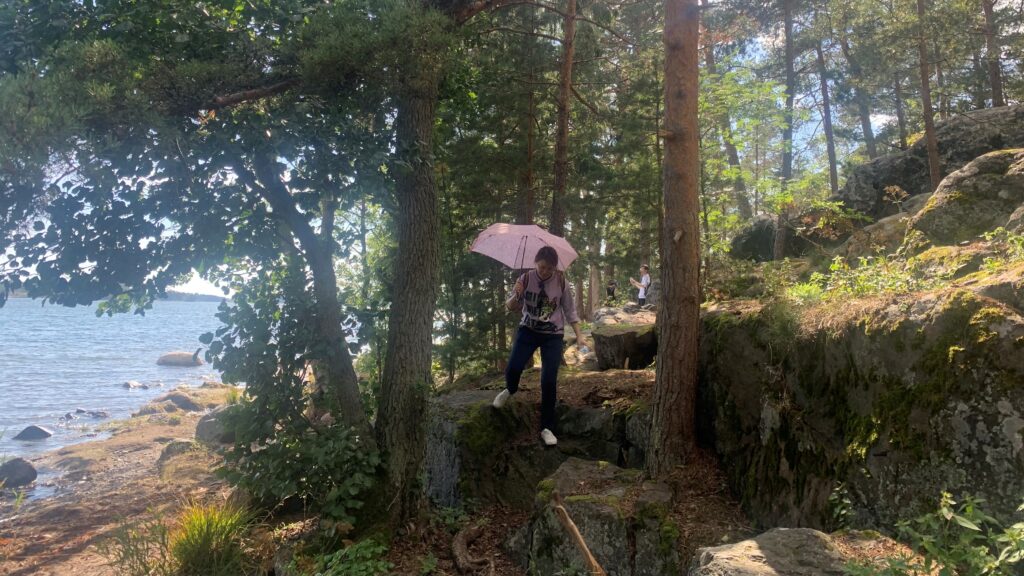
Takeaways
Feedback
The feedback received for the conference, both during and after it, has been overwhelmingly positive. Participants reflected especially positively on the organisation, which, quoting one attendee, “created an invaluable forum for intellectual exchange”.
Lessons learned
The takeaways for a conference of this size, of course, range from organisational lessons learned to takeaways from the presentations, speeches, and workshops themselves. To focus on the latter, perhaps the most relevant takeaway from the 2023 JoLII-GINTL Global Conference is that collaboration and active participation in research make a difference. Even the meetings and collaborations that sparked during the conference themselves are already proving to be infinitely valuable, with new research projects blooming up between people who never even previously met. The more individual lessons learned in different presentations and workshops – such as ways of preserving indigenous languages through education and best practices for early childhood education – all arise from collaborations between people, whether it be through research or experiences. All these takeaways, in the end, culminate into one big lesson learned: that global conferences are a wonderful way to meet colleagues, and an even better way to create change.
Photo (by Veikko Somerpuro): The conference venue at the University of Helsinki during the conference

***
Featured photo by Veikko Somerpuro, 2023
Contributors to this article
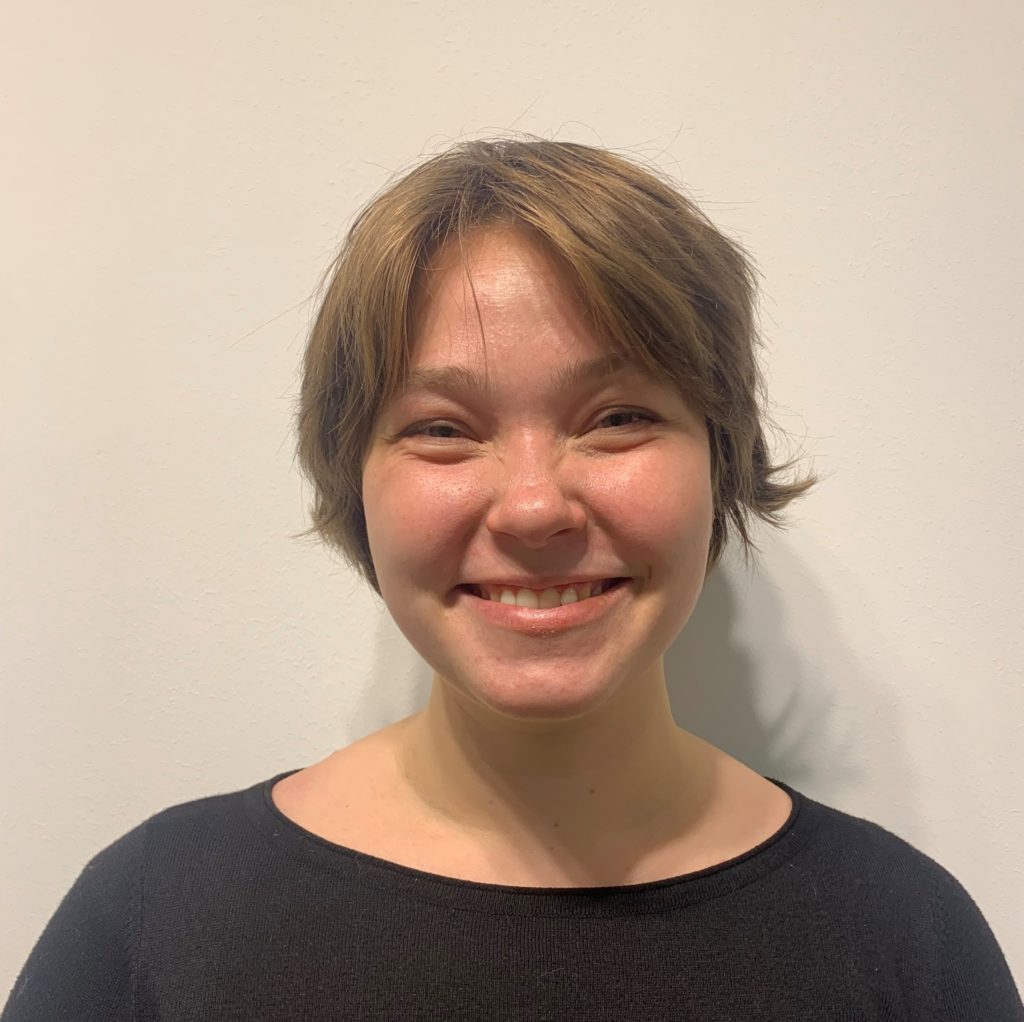
Luna Erica
Research Assistant, Global Innovation Network for Teaching and Learning (GINTL)
luna.erica[at]helsinki.fi
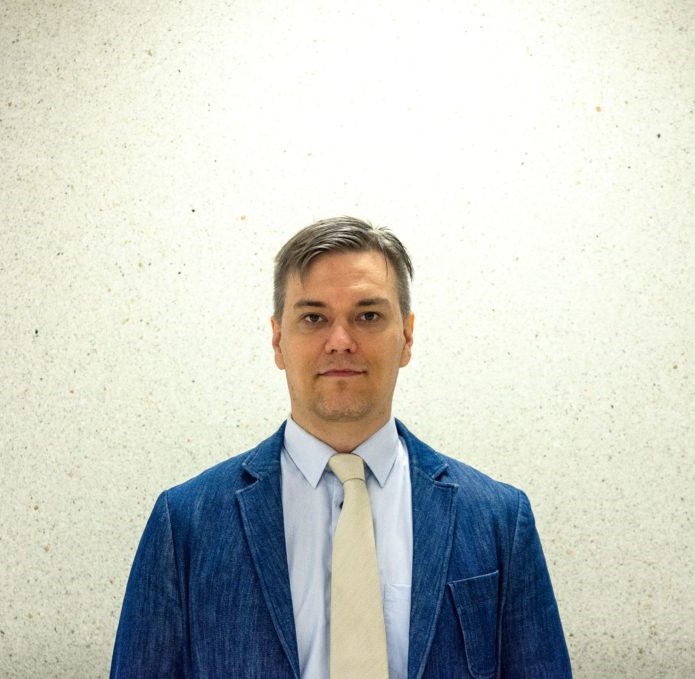
Olli-Pekka Malinen
University Lecturer, University of Helsinki
hanna.lampi[at]helsinki.fi

Shuanghong Jenny Niu
University Lecturer, University of Helsinki
hanna.lampi[at]helsinki.fi
